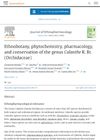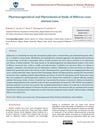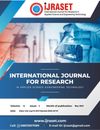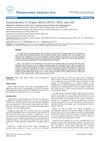 2 citations,
March 2021 in “Carpathian Journal of Food Science and Technology”
2 citations,
March 2021 in “Carpathian Journal of Food Science and Technology” Caraway, Chinese chives, and cassia may improve health and prevent diseases due to their nutrients and medicinal properties.
[object Object]  January 2019 in “Journal of Pharmacognosy and Phytochemistry”
January 2019 in “Journal of Pharmacognosy and Phytochemistry” The methanolic fruit extract of Citrullus colocynthis contains bioactive compounds that may support its use in traditional medicine and drug development.
 January 2024 in “International Journal of Research Publication and Reviews”
January 2024 in “International Journal of Research Publication and Reviews” The herbal hair serum with rosemary, hibiscus, and neem is safe and effective for hair care.
 6 citations,
November 2021 in “Journal of Ethnopharmacology”
6 citations,
November 2021 in “Journal of Ethnopharmacology” Calanthe orchids have medicinal potential and contain 265 chemical compounds, but are underexplored.
 1 citations,
June 2023 in “International journal of basic science in medicine”
1 citations,
June 2023 in “International journal of basic science in medicine” Adiantum capillus-veneris may help with respiratory issues, but more research is needed.
 19 citations,
August 2014 in “Journal of Ethnopharmacology”
19 citations,
August 2014 in “Journal of Ethnopharmacology” The study created a test that found hormonal and toxic effects in plant and fungal extracts using prostate cancer cells.
 March 2024 in “Journal of medicinal plants studies”
March 2024 in “Journal of medicinal plants studies” Hibiscus has medicinal benefits but can be toxic in high doses and is unsafe for pregnant women and infants.
13 citations,
January 2023 in “Frontiers in Nutrition” Lindera aggregata has many beneficial compounds that can help prevent and manage diseases.
 January 2024 in “Biochemistry Research International”
January 2024 in “Biochemistry Research International” Compounds from Ziziphus spina-christi roots show strong antibacterial and antioxidant potential.
 9 citations,
July 2021 in “Journal of Natural Medicines”
9 citations,
July 2021 in “Journal of Natural Medicines” Over 150 new molecules with biological activities were found in traditional herbal medicines, some with potential for new drug development.

Ayurvedic herbs may reduce side effects and improve effectiveness of cancer treatments.
 19 citations,
July 2018 in “Medicines”
19 citations,
July 2018 in “Medicines” Juniperus plants contain compounds with potential for developing various medical treatments.
 61 citations,
May 2015 in “Planta”
61 citations,
May 2015 in “Planta” Certain fungi and bacteria help orchid seeds germinate and plants grow better.
 8 citations,
April 2019 in “International journal of scientific research in biological science”
8 citations,
April 2019 in “International journal of scientific research in biological science” Tridax procumbens is a widely used medicinal plant with many health benefits.
 1 citations,
February 2024 in “International Journal of Pharmacognosy & Chinese Medicine”
1 citations,
February 2024 in “International Journal of Pharmacognosy & Chinese Medicine” Hibiscus rosa-sinensis Linn. has many medicinal benefits and needs proper identification for effective use.
 May 2024 in “Scientific African”
May 2024 in “Scientific African” Three natural compounds from Ghanaian plants may help treat BPH and alopecia.
 May 2022 in “International Journal for Research in Applied Science and Engineering Technology”
May 2022 in “International Journal for Research in Applied Science and Engineering Technology” Eclipta prostrata has potential as a natural antibiotic.
 1 citations,
January 2017 in “Pharmaceutica Analytica Acta”
1 citations,
January 2017 in “Pharmaceutica Analytica Acta” The research confirmed that certain methods are reliable for standardizing Eclipta alba and ensuring its safety and quality in herbal products.
 17 citations,
February 2015 in “Phytochemistry Reviews”
17 citations,
February 2015 in “Phytochemistry Reviews” Southeast Asian herbs show promise for skin and hair care, but more research is needed to confirm their effectiveness in cosmetics.
 1 citations,
November 2023 in “Naunyn-Schmiedeberg's archives of pharmacology”
1 citations,
November 2023 in “Naunyn-Schmiedeberg's archives of pharmacology” Henna has potential health benefits and can treat various conditions, but more research is needed to confirm safety and effectiveness.
 July 2024 in “International Journal of Advanced Research in Science Communication and Technology”
July 2024 in “International Journal of Advanced Research in Science Communication and Technology” Hibiscus micranthus leaf extract is safe and effective for antibacterial and wound healing.
 3 citations,
January 2011 in “Journal of biologically active products from nature”
3 citations,
January 2011 in “Journal of biologically active products from nature” The F1 herbal mixture grew hair well and could treat hair loss without the side effects of common treatments.
 May 2022 in “International Journal of Health Sciences (IJHS)”
May 2022 in “International Journal of Health Sciences (IJHS)” Hibiscus Rosa Sinensis Linn is a tropical plant used for various medicinal purposes due to its many beneficial properties and components.
11 citations,
May 2021 in “Asian Journal of Pharmaceutical and Clinical Research” Eclipta alba (Bhringraj) helps protect the liver and promotes hair growth.
January 2025 in “Microorganisms” Using Armillaria strain A541 boosts Polyporus umbellatus yield and polysaccharide content.
4 citations,
May 2021 in “Research Journal of Science and Technology” Hibiscus rosa sinensis shows promise for treating various health conditions and promoting hair growth.
[object Object] 6 citations,
January 2023 in “Evidence-based Complementary and Alternative Medicine” Combining yoga and certain herbs can effectively manage PCOS symptoms and improve quality of life.
 1 citations,
June 2023 in “Ethnobotany research and applications”
1 citations,
June 2023 in “Ethnobotany research and applications” The review concludes that the Ziziphus species, especially jujube, may promote hair growth and have various health benefits, warranting more research.
 4 citations,
February 2017 in “Journal of Cutaneous Medicine and Surgery”
4 citations,
February 2017 in “Journal of Cutaneous Medicine and Surgery” Compounds from certain trees used by First Nations people show potential for treating skin conditions and promoting hair growth, but more research is needed to confirm their safety and effectiveness.
 5 citations,
November 2017 in “Asian journal of pharmaceutical and clinical research”
5 citations,
November 2017 in “Asian journal of pharmaceutical and clinical research” Pakis Gajah (Angiopteris evecta) water extract may promote hair growth in rabbits, but more research is needed for human use.

























